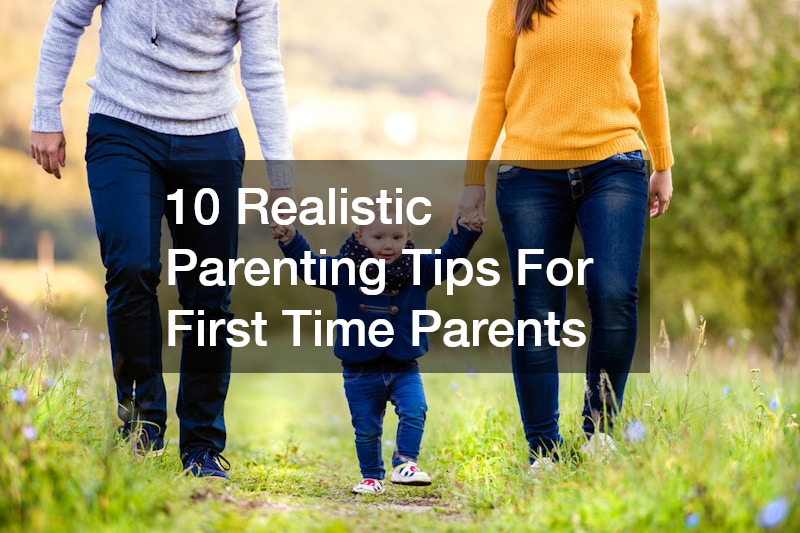Parenting is one of the most transformative and fulfilling experiences in life. For first-time parents, however, the journey can also be a whirlwind of emotions, uncertainties, and steep learning curves. From the moment you bring your newborn home, you are faced with a cascade of new responsibilities, unexpected challenges, and profound joys. While the internet, parenting books, and advice from well-meaning friends and family can provide an overwhelming amount of information, what truly matters is finding a balanced approach, with realistic parenting goals, that works for you and your family.
This is where realistic parenting comes into play. Rather than striving for perfection, realistic parenting emphasizes practicality, self-compassion, and flexibility. It acknowledges that every parent and every child is unique and that no two parenting journeys will look the same. Whether it’s navigating sleepless nights, creating a nurturing bond, or finding time for yourself amidst the chaos, embracing a realistic outlook can make the transition to parenthood smoother and more enjoyable.
In this comprehensive guide, we’ll explore ten key parenting tips tailored to first-time parents. These tips are grounded in the principle of realistic parenting and cover everything from understanding your newborn’s needs to maintaining a strong partnership with your co-parent. Along the way, you’ll discover practical advice, strategies for overcoming common challenges, and reminders that it’s okay to not have all the answers. Parenting is a continuous learning process, and with a little patience and a lot of love, you can create a happy, healthy environment for your growing family.
Let’s dive into these ten essential tips and make your parenting journey a rewarding adventure.
1. How Can I Better Understand My Newborn’s Needs?
Every newborn comes with their own set of cues and behaviors. Learning to interpret these signals is the cornerstone of effective parenting.
1.1 Observing Cues and Signals
Newborns communicate primarily through body language and sounds. Whether it’s a certain cry for hunger or a restless wiggle for discomfort, paying close attention will help you anticipate their needs.
1.2 Establishing Feeding Routines
A consistent feeding schedule can bring structure to your day and promote better digestion for your baby. Whether breastfeeding or bottle-feeding, stay attuned to their hunger cues.
1.3 Addressing Sleep Patterns
Babies sleep in short cycles. Understanding these patterns and incorporating realistic parenting strategies—like aligning your rest with their sleep times—will help you stay well-rested.
1.4 Comfort through Skin-to-Skin Contact
This simple yet profound practice strengthens your bond with your baby, promotes a sense of security, and even supports healthy development.
1.5 Understanding Crying and Colic
Crying is normal, but persistent colic may require additional support. Consider consulting family dentistry experts to rule out oral discomfort if symptoms persist.
2. What Is the Best Way to Manage My Time as a Parent?
Time management is a vital skill for first-time parents. Juggling responsibilities while meeting your baby’s needs can feel like an uphill battle, but realistic parenting can help.

2.1 Prioritizing Tasks and Needs
Determine what truly matters each day. Laundry can wait—your baby’s needs and your well-being come first.
2.2 Creating a Schedule That Works
Structure your day to include feeding, playtime, and rest for both you and your baby. Adapt as needed because flexibility is key in realistic parenting.
2.3 Delegating Responsibilities
Enlist the help of your partner or trusted family members. Whether it’s asking a local fence installer to secure your backyard or hiring carpet cleaning services, outsourcing can alleviate stress.
2.4 Incorporating Self-Care into Your Routine
Your well-being impacts your parenting. Take small breaks to recharge, even if it’s just enjoying a quiet moment with coffee.
2.5 Setting Realistic Goals and Expectations
Don’t aim for perfection. Celebrate small wins and remember that progress is more important than perfection.
3. How Can I Build a Strong Bond with My Baby?
Building a connection with your baby lays the foundation for a secure and loving relationship.
3.1 The Importance of Eye Contact
Eye contact during feeding or playtime fosters trust and helps your baby feel seen and loved. regardless of if you had your baby via surrogate or natural birth.
3.2 Engaging in Play and Exploration
Interactive play encourages development and strengthens your bond. Even a simple walk in a stroller can be a learning adventure.
3.3 The Role of Music and Sound
Soft lullabies or even the sound of your voice can be soothing. Incorporate music to create a calming environment.
3.4 Reading to Your Baby
Introduce books early to stimulate their language skills and nurture a love for learning. Many local schools emphasize the importance of early literacy.
3.5 Consistent Hugs and Physical Affection
Touch is a powerful way to express love and security, forming the cornerstone of realistic parenting.
4. How Do I Handle Sleep Challenges with My Child?
Sleep deprivation is a hallmark of early parenthood. However, understanding your baby’s sleep needs can lead to better nights for everyone.

4.1 Establishing a Nighttime Routine
A calming bedtime routine, like a warm bath followed by a story, signals that it’s time for sleep.
4.2 Understanding Sleep Cycles
Babies have shorter sleep cycles than adults. Anticipate wake-ups and adjust your expectations accordingly.
4.3 Safe Sleeping Environments
Ensure your baby’s crib is free of loose bedding or toys to reduce risks and promote restful sleep.
4.4 Navigating Naptime Struggles
Short and frequent naps are normal. Gradually encourage longer naps by creating a quiet, consistent sleep space.
4.5 Recognizing Sleep Regressions
Sleep regressions are temporary phases. Embrace realistic parenting by adapting your routine without guilt or frustration.
5. What Are Some Effective Parenting Techniques for Discipline?
Discipline doesn’t mean punishment; it’s about teaching and guiding your child as they grow.
5.1 Consistency in Rules and Expectations
Clear boundaries help children understand what’s expected.
5.2 Positive Reinforcement
Celebrate good behavior with praise or small rewards to encourage repetition.
5.3 Calm and Constructive Correction
When correcting behavior, remain calm and use a gentle but firm tone to explain what’s wrong.
5.4 Age-Appropriate Consequences
Tailor consequences to your child’s developmental stage for maximum impact.
5.5 Communication and Patience
Talk to your child about their feelings and actions, even if they’re too young to fully understand.
6. How Can We Promote Healthy Development in Our Child?
Fostering your child’s physical and emotional growth is essential for their overall well-being.

6.1 Nutrition and Balanced Diet
Introduce a variety of foods to support growth and immune health. Even picky eaters can benefit from creative meal planning.
6.2 Encouraging Physical Activity
Simple activities like tummy time or guided play promote motor skills and strength.
6.3 Early Language and Literacy Skills
Talk, sing, and read to your baby daily to enhance their language abilities.
6.4 Social and Emotional Learning
Encourage interaction with peers at the best local daycare or playdates to nurture social skills.
6.5 Regular Pediatric Checkups
Consistent medical checkups are critical. If concerns arise, professionals like a home remodeling company may suggest safety upgrades for a child-proofed space.
7. How Do I Balance Parenting with My Relationship with My Partner?
Parenting together can strengthen your bond as a couple if approached with intention and care.
7.1 Open and Honest Communication
Talk about your feelings and challenges regularly to maintain a strong connection.
7.2 Scheduling Couple Time
Plan date nights or quiet evenings together to keep your relationship thriving.
7.3 Supporting Each Other’s Roles
Acknowledge and appreciate each other’s contributions, whether it’s handling finances or searching for custom trucks for sale to fit the family’s needs.
7.4 Sharing Parenting Responsibilities
Divide tasks equitably to reduce stress and foster teamwork.
7.5 Celebrating Milestones Together
From your baby’s first steps to their first smile, savor these moments as a team.
8. How Can We Financially Prepare for Our New Family?
The financial impact of a new baby is significant. Planning ahead can reduce stress.

8.1 Creating a Budget
Track your expenses and allocate funds for baby essentials.
8.2 Saving for Future Expenses
Start a savings fund for education, medical needs, and unforeseen expenses.
8.3 Investing in Education Savings
Explore education savings plans early to give your child a financial head start.
8.4 Managing Unexpected Costs
Having a contingency fund will ease the burden of surprise expenses like a sudden need for bathtub repair.
8.5 Exploring Financial Assistance Options
Seek out community programs or grants that can help cover childcare or healthcare costs.
9. When Should I Seek Help with Parenting Challenges?
No one should face parenting challenges alone. Knowing when to seek support is a sign of strength.
9.1 Recognizing Signs of Overwhelm
Feeling persistently stressed or exhausted is a sign you may need a break or additional support.
9.2 Finding Support Networks
Parenting groups, both online and in-person, offer camaraderie and advice.
9.3 Consulting Pediatric and Parenting Experts
Experts can provide personalized guidance tailored to your family’s needs.
9.4 Joining Parenting Groups and Classes
Community classes on realistic parenting can introduce you to practical techniques and local resources.
9.5 Recognizing and Addressing Postpartum Issues
Postpartum depression or anxiety is common. Don’t hesitate to seek professional help.
10. How Do I Stay Informed on Parenting Trends and Information?
10. How Do I Stay Informed on Parenting Trends and Information?
Parenting is an ever-evolving journey, and staying informed is key to navigating it with confidence. With new research, expert advice, and technological advancements emerging all the time, today’s parents have access to a wealth of information. However, it can be overwhelming to sift through it all. The goal of realistic parenting is to find credible, practical resources that align with your family’s needs and values. By staying informed, you can make educated decisions that benefit your child and strengthen your parenting approach.
10.1 Engaging with Parenting Blogs and Websites
Parenting blogs and websites can be invaluable resources for first-time parents. They offer tips, personal stories, and expert advice on everything from managing sleep schedules to home improvements, like basement renovation services for a family-friendly play area. Look for blogs written by experienced parents or childcare experts who share realistic and relatable insights. Bookmark trusted sites to reference as your child grows, but remember to avoid information overload. The key is to pick a few reliable sources that resonate with your parenting style.
10.2 Listening to Parenting Podcasts
Parenting podcasts are a convenient way to stay informed while multitasking. Whether you’re folding laundry, driving to work, or taking a stroller walk, podcasts can provide expert interviews, tips, and encouragement. Topics range from developmental milestones to fostering positive discipline. Some podcasts even dive into niche areas, like how to navigate unique family dynamics such as welcoming a baby via surrogate. Find a few podcasts that resonate with you, and let them inspire and empower you on your parenting journey.
10.3 Reading Parenting Books and Publications
Books offer a wealth of in-depth knowledge, and there’s a parenting book for nearly every situation or question. Classic titles provide timeless advice, while newer releases often incorporate the latest research. Some books focus on specific topics, like sleep training, feeding techniques, or realistic parenting strategies for managing work-life balance. Consider checking reviews or asking for recommendations from fellow parents or professionals. Many local schools and libraries also have parenting resources available for free, making it easy to explore different perspectives and approaches.
10.4 Joining Online Parenting Communities
Social media platforms and online forums connect parents from all walks of life. These communities offer a safe space to share experiences, ask questions, and find support. For instance, you can join groups focused on realistic parenting or forums dedicated to specific challenges, such as managing sleep regressions or finding carpet cleaning services after a toddler spill. Keep in mind that every family is different, so what works for one parent may not work for another. Use these platforms to gather ideas, but always trust your instincts when applying advice to your own situation.
10.5 Attending Parenting Workshops and Seminars
In-person or virtual workshops and seminars can provide hands-on learning opportunities. These events often feature experts who cover a variety of topics, such as child development, health and safety, and parenting techniques. Attending a workshop can also help you connect with local parents, forming a network of support. Look for workshops at community centers, hospitals, or even through your best local daycare, which may offer parenting classes as part of its services. The interactive nature of workshops allows you to ask questions, practice skills, and gain confidence in your parenting abilities.
Becoming a parent is a profound and life-changing experience. By embracing realistic parenting, you can create a nurturing and joyful environment for your family. From understanding your newborn’s needs to maintaining your well-being, these tips will help you thrive as a first-time parent. Remember, there’s no one-size-fits-all approach—what matters most is your love, patience, and willingness to learn along the way.
